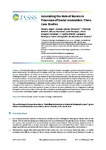Mostrar o rexistro simple do ítem
Simulating the Role of Norms in Processes of Social Innovation: Three Case Studies
| dc.contributor.author | Jager, Wander | |
| dc.contributor.author | Guijarro-Berdiñas, Bertha | |
| dc.contributor.author | Bouman, Loes | |
| dc.contributor.author | Antosz, Patrycja | |
| dc.contributor.author | Alonso-Betanzos, Amparo | |
| dc.contributor.author | Salt, Douglas | |
| dc.contributor.author | Polhill, J. Gary | |
| dc.contributor.author | Rodríguez Arias, Alejandro | |
| dc.contributor.author | Sánchez-Maroño, Noelia | |
| dc.date.accessioned | 2024-04-12T11:46:58Z | |
| dc.date.available | 2024-04-12T11:46:58Z | |
| dc.date.issued | 2024-01 | |
| dc.identifier.citation | W. Jager et al., «Simulating the Role of Norms in Processes of Social Innovation: Three Case Studies», JASSS, vol. 27, n.o 1, p. 6, 2024, doi: 10.18564/jasss.5168. | es_ES |
| dc.identifier.issn | 1460-7425 | |
| dc.identifier.uri | http://hdl.handle.net/2183/36168 | |
| dc.description.abstract | [Absctract]: Norms and values are critical drivers in social innovation processes, such as community projects on sustainable energy. Simulating such processes could help uncover conditions that support these social innovations. Capturing the rich literature on drivers of social innovation in more simple computational rules is a challenge however. In this paper, we present three empirically grounded case simulations addressing social innovations where norms and values play a role. The results emphasise that normative influences and values affecting opinions and behaviour cannot be addressed in isolation when studying real cases of social innovation. An integrated perspective is needed to identify who is most likely to deviate from a given norm, and how contagious this deviation is. These factors, such as needs, values, similarity and reputation, are embedded in a wider behavioural and social-cognitive context and hence require embedding into an integrated modelling framework of humans in the community. We conclude by considering how social-economic data can be used in combination with theory-based rules to simulate normative processes in a convincing way. | es_ES |
| dc.description.sponsorship | This article is based on work conducted in the SMARTEES project, funded by the European Union’s Horizon 2020 research and innovation programme under grant agreement No 763912. We would like to thank the SMARTEES team for their input and collaboration during this project. We also would like to thank two anonymous referees for critical and constructive comments that helped us to improve the text, and Robert Coates for improving the readability of the text. | es_ES |
| dc.language.iso | eng | es_ES |
| dc.publisher | SimSoc Consortium | es_ES |
| dc.relation | info:eu-repo/grantAgreement/EC/H2020/763912 | es_ES |
| dc.relation.uri | https://doi.org/10.18564/jasss.5168 | es_ES |
| dc.rights | Atribución 3.0 España | es_ES |
| dc.rights.uri | http://creativecommons.org/licenses/by/3.0/es/ | * |
| dc.subject | Norms | es_ES |
| dc.subject | Values | es_ES |
| dc.subject | Social Innovation | es_ES |
| dc.subject | Energy | es_ES |
| dc.subject | Sustainability | es_ES |
| dc.title | Simulating the Role of Norms in Processes of Social Innovation: Three Case Studies | es_ES |
| dc.type | info:eu-repo/semantics/article | es_ES |
| dc.rights.access | info:eu-repo/semantics/openAccess | es_ES |
| UDC.journalTitle | Journal of Artificial Societies and Social Simulation (JASSS) | es_ES |
| UDC.volume | 27 | es_ES |
| UDC.issue | 1 | es_ES |
Ficheiros no ítem
Este ítem aparece na(s) seguinte(s) colección(s)
-
GI-LIDIA - Artigos [54]
-
OpenAIRE [287]






